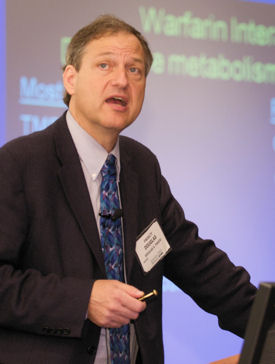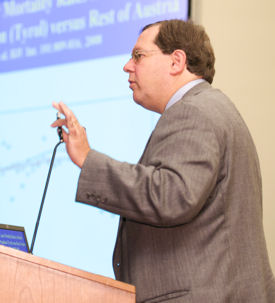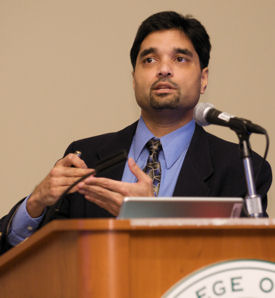ACP presses its case for payments, pilots and primary care
Leadership Day attendees focused on three key areas when they met with their congress people for comprehensive payment reforms.
“Who's taking care of America?” Sen. John Kerry (D-MA) joked upon entering his Capitol Hill office and finding it crowded to capacity with internists.
The College's annual Leadership Day, held for the first time during Internal Medicine week, brought more than 500 physicians to Capitol Hill on May 14 to lobby their elected representatives in person. It was the College's largest Leadership Day ever, with physicians coming from all 50 states, the District of Columbia and Puerto Rico to encourage their elected officials to support the College's legislative priorities.
Requests focused on three major areas: preventing pending Medicare physician payment cuts, funding pilots of the patient-centered medical home, and expanding access to primary care. The doctors told real-life anecdotes to convince politicians of primary care's precarious situation.
“I'm $60,000 in debt. I live with four people. I don't go out that much,” University of Washington medical student Gabriel Fine told Sen. Maria Cantwell (D-WA). He went on to explain how the prospect of declining reimbursements is pushing many students toward careers in more lucrative subspecialties over general internal medicine.
Ms. Cantwell was one of the most sympathetic ears that the internists found. Just before Leadership Day, she agreed to sponsor legislation proposed by the College. The “Patient Access to Primary Care Act” would expand scholarships, provide payment for care coordination, and institute loan-forgiveness programs for young physicians who practice primary care in underserved areas.
Ms. Cantwell, along with many of her colleagues, also expressed support for the College's efforts to halt the Sustainable Growth Rate cuts scheduled for July 1, 2008. Legislators from both sides of the aisle assured the internists that Congress was working hard to avert the cuts, but expressed less certainty about whether they would be halted for a full 18 months, as ACP is urging.
“It's not a foregone conclusion that we can get this done, so the physician community really needs to get active on this,” said Chris Dawe, a legislative aide to Mr. Kerry.
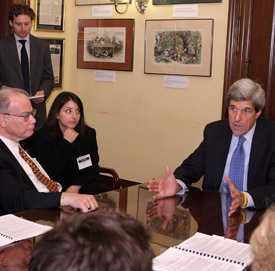
Legislators and their aides also repeatedly asked the visiting physicians for their help crafting more comprehensive reforms of the U.S. health care system. “We really need your input. We need your help to do a reality check about the things that look good on paper,” said Sen. John Cornyn (R-TX).
He also shared internists' frustration with the necessity of annually lobbying Congress to halt the SGR cuts. “Congress never lets it go through. That's a good thing but it also demonstrates how unserious and artificial this all is. We need to start over again,” said Mr. Cornyn.
Mr. Kerry expressed optimism that more far-reaching reforms will be possible under the next administration. “Realizing we're not going to get it done this year, we're laying the groundwork for next year with a new president,” he said.
Issues of health care access and the physician workforce shortage were also discussed during many of the Hill visits. Washington state nephrologist Wassim A. Khawandi, FACP, explained that his lobbying is motivated by the number of patients who look to him for their primary care. “I'm not as efficient at doing this as these guys. That's why I am here,” he said.
“You can't give everyone access and not have anyone in the pipeline to provide it,” Massachusetts internist Mandy Krauthamer, ACP Associate Member, told Mr. Kerry.
The legislators expressed familiarity and concern with the crisis of primary care. “We're looking for ideas of what will attract people to primary care … so you don't have to become a boutique dermatologist with your own line of skin care,” said Mr. Kerry.
The physicians urged legislators to support just such a real-world test of proposals for improving primary care, by approving $500 million to fund a Medicare pilot of the patient-centered medical home. It was one of the toughest sells of the day, as legislators were reluctant to commit the financially strapped federal government to a new expenditure.
“Recognizing that there are budget issues, what would the cost be if we don't do something? We're looking at a pound of prevention,” said Washington state internist Carrie A. Horwitch, FACP.
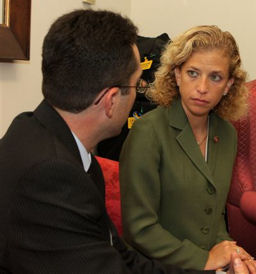
The politicians supported the College's ideas about funding medical homes and education, but were consistently pessimistic about the money. Rep. Louise McIntosh Slaughter (D-NY) noted the difficulty that Congress has faced even over funding of higher education for veterans.
“This is a government that's broke,” she said. “I imagine that it would be harder to get loan forgiveness for people with the possibility of good income.”

